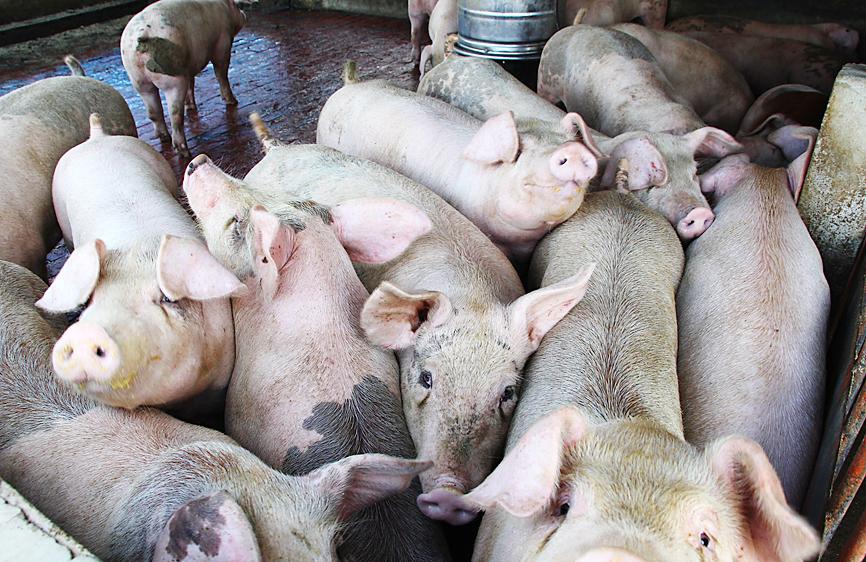The medical community on Friday called for an assessment of the risk of consuming meat containing ractopamine as Taiwan plans to allow imports of US pork containing the controversial lean meat additive.
President Tsai Ing-wen (蔡英文) earlier on Friday announced that Taiwan would set a standard for ractopamine in imported pork and ease restrictions on US beef from cattle aged more than 30 months in an apparent attempt to pave the way to negotiate a trade deal with the US.
Su Wei-shuo (蘇偉碩), a clinical psychiatrist who has attended technical advisory committee meetings in the past on the import of US beef, worries that the move is being made without a sound scientific basis, saying that the international community has not done a risk assessment on long-term consumption of ractopamine.

Photo: Lin Yi-chang, Taipei Times
When the Codex Alimentarius Commission, the body responsible for implementing international food standards, set the allowable amount of ractopamine in 2012, it did so by a vote, because of the lack of a scientific consensus on the issue, Su said.
The commission standard allows up to 10 micrograms per kilogram (mcg/kg) of ractopamine in beef and pork, 40mcg/kg in livers and 90mcg/kg in kidneys.
The maximum residue limit was approved by a 69-67 vote, showing the equal support both for and against the standard, Su said, urging the government to publish a risk assessment report on the issue given the lack of hard data.
Ractopamine does not treat animal diseases, but saves feed costs and increases profits, Su said.
Food safety risks should not be shouldered by consumers, Su said, adding that there could be risks to pregnant women, infants, older people, and patients with liver, kidney or other chronic diseases.
The residual amount of ractopamine in the muscles of cows and pigs are low, and the risks are relatively controllable, said Yang Chen-chang (楊振昌), director of the Division of Clinical Toxicology and Occupational Medicine at Taipei Veterans General Hospital.
However, higher residue levels are found in internal organs such as the lungs and kidneys, and risk assessments should be conducted if imports of internal organs are allowed, Yang said.
In the past, some experts said that animals that feed on additives promoting leanness are more prone to hyperactivity, higher stress levels and faster heart rates, Yang said, adding that the EU believes that there is the possibility of genotoxicity.

Taipei has once again made it to the top 100 in Oxford Economics’ Global Cities Index 2025 report, moving up five places from last year to 60. The annual index, which was published last month, evaluated 1,000 of the most populated metropolises based on five indices — economics, human capital, quality of life, environment and governance. New York maintained its top spot this year, placing first in the economics index thanks to the strength of its vibrant financial industry and economic stability. Taipei ranked 263rd in economics, 44th in human capital, 15th in quality of life, 284th for environment and 75th in governance,

The Sports Administration yesterday demanded an apology from the national table tennis association for barring 17-year-old Yeh Yi-tian (葉伊恬) from competing in the upcoming World Table Tennis (WTT) United States Smash tournament in Las Vegas this July. The sports agency said in a statement that the Chinese Taipei Table Tennis Association (CTTTA) must explain to the public why it withdrew Yeh from the WTT tournament in Las Vegas. The sports agency said it contacted the association to express its disapproval of the decision-making process after receiving a complaint from Yeh’s coach, Chuang

Control Yuan Secretary-General Lee Chun-yi (李俊俋) tendered his resignation last night, admitting that he had misused a government vehicle, as reported by media. His resignation was immediately accepted by the Control Yuan. In a statement explaining why he had resigned, Lee apologized for using a Control Yuan vehicle to transport his dog to a pet grooming salon on May 20. The issue first came to light late last month, when TVBS News reported that Lee had instructed his driver to take the dog to the salon. The news channel broadcast photos that it said were taken by an unnamed whistle-blower, which purportedly showed the

A former officer in China’s People’s Liberation Army (PLA) who witnessed the aftermath of the 1989 Tiananmen Square massacre has warned that Taiwan could face a similar fate if China attempts to unify the country by force. Li Xiaoming (李曉明), who was deployed to Beijing as a junior officer during the crackdown, said Taiwanese people should study the massacre carefully, because it offers a glimpse of what Beijing is willing to do to suppress dissent. “What happened in Tiananmen Square could happen in Taiwan too,” Li told CNA in a May 22 interview, ahead of the massacre’s 36th anniversary. “If Taiwanese students or